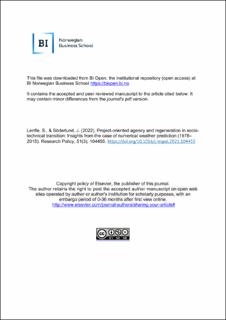Project-oriented agency and regeneration in socio-technical transition: Insights from the case of numerical weather prediction (1978-2015)
Peer reviewed, Journal article
Accepted version
Permanent lenke
https://hdl.handle.net/11250/3086114Utgivelsesdato
2022Metadata
Vis full innførselSamlinger
- Scientific articles [2181]
Sammendrag
This paper analyzes the unfolding of socio-technical transition (STT) using the multi-level perspective (MLP) framework. It relies on an in-depth case study of the “quiet revolution” of numerical weather prediction. The study reveals how key actors targeted the reverse salient of data assimilation and thereby facilitated the tran- sition toward a new “variational” regime. In so doing, the paper makes three contributions to the STT literature: (1) it identifies a new type of transition pathway, “regeneration,” in which the regime transforms itself from within, despite the lack of changes in landscape pressure, to overcome internal tensions; (2) it showcases “project-oriented agency” as the central mechanism of this transition, which allows the actors to join forces and cooperate to counteract the reverse salient; and (3) it proposes a process model of project-oriented agency that accounts for the role of the reverse salient in the regeneration pathway. Project-oriented agency and regeneration in socio-technical transition: Insights from the case of numerical weather prediction (1978-2015)

